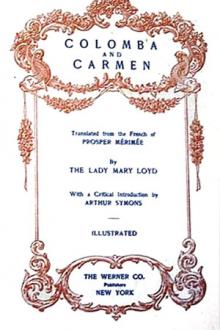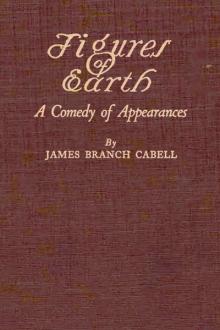The Adventures of Gerard, Arthur Conan Doyle [thriller novels to read txt] 📗

- Author: Arthur Conan Doyle
Book online «The Adventures of Gerard, Arthur Conan Doyle [thriller novels to read txt] 📗». Author Arthur Conan Doyle
It was clear to me that in order to succeed in my enterprise I should take a small force and depend rather upon surprise than upon numbers. A large body could not conceal itself, would have great difficulty in getting food, and would cause all the Russians around us to concentrate for its certain destruction. On the other hand, if a small body of cavalry could get past the Cossacks unseen it was probable that they would find no troops to oppose them, for we knew that the main Russian army was several days' march behind us. This corn was meant, no doubt, for their consumption. A squadron of Hussars and thirty Polish Lancers were all whom I chose for the venture. That very night we rode out of the camp, and struck south in the direction of Minsk.
Fortunately there was but a half moon, and we were able to pass without being attacked by the enemy. Twice we saw great fires burning amid the snow, and around them a thick bristle of long poles. These were the lances of Cossacks, which they had stood upright while they slept. It would have been a great joy to us to have charged in amongst them, for we had much to revenge, and the eyes of my comrades looked longingly from me to those red flickering patches in the darkness. My faith, I was sorely tempted to do it, for it would have been a good lesson to teach them that they must keep a few miles between themselves and a French army. It is the essence of good generalship, however, to keep one thing before one at a time, and so we rode silently on through the snow, leaving these Cossack bivouacs to right and left. Behind us the black sky was all mottled with a line of flame which showed where our own poor wretches were trying to keep themselves alive for another day of misery and starvation.
All night we rode slowly onward, keeping our horses' tails to the Pole Star. There were many tracks in the snow, and we kept to the line of these, that no one might remark that a body of cavalry had passed that way.
These are the little precautions which mark the experienced officer. Besides, by keeping to the tracks we were most likely to find the villages, and only in the villages could we hope to get food. The dawn of day found us in a thick fir-wood, the trees so loaded with snow that the light could hardly reach us. When we had found our way out of it it was full daylight, the rim of the rising sun peeping over the edge of the great snow-plain and turning it crimson from end to end. I halted my Hussars and Lancers under the shadow of the wood, and I studied the country. Close to us there was a small farm-house. Beyond, at the distance of several miles, was a village. Far away on the sky-line rose a considerable town all bristling with church towers. This must be Minsk. In no direction could I see any signs of troops. It was evident that we had passed through the Cossacks and that there was nothing between us and our goal. A joyous shout burst from my men when I told them our position, and we advanced rapidly toward the village.
I have said, however, that there was a small farm-house immediately in front of us. As we rode up to it I observed that a fine grey horse with a military saddle was tethered by the door. Instantly I galloped forward, but before I could reach it a man dashed out of the door, flung himself on to the horse, and rode furiously away, the crisp, dry snow flying up in a cloud behind him. The sunlight gleamed upon his gold epaulettes, and I knew that he was a Russian officer. He would raise the whole country-side if we did not catch him. I put spurs to Violette and flew after him. My troopers followed; but there was no horse among them to compare with Violette, and I knew well that if I could not catch the Russian I need expect no help from them.
But it is a swift horse indeed and a skilful rider who can hope to escape from Violette with Etienne Gerard in the saddle. He rode well, this young Russian, and his mount was a good one, but gradually we wore him down.
His face glanced continually over his shoulder—dark, handsome face, with eyes like an eagle—and I saw as I closed with him that he was measuring the distance between us. Suddenly he half turned; there were a flash and a crack as his pistol bullet hummed past my ear.
Before he could draw his sword I was upon him; but he still spurred his horse, and the two galloped together over the plain, I with my leg against the Russian's and my left hand upon his right shoulder. I saw his hand fly up to his mouth. Instantly I dragged him across my pommel and seized him by the throat, so that he could not swallow. His horse shot from under him, but I held him fast and Violette came to a stand. Sergeant Oudin of the Hussars was the first to join us. He was an old soldier, and he saw at a glance what I was after.
“Hold tight, Colonel,” said he, “I'll do the rest.”
He slipped out his knife, thrust the blade between the clenched teeth of the Russian, and turned it so as to force his mouth open. There, on his tongue, was the little wad of wet paper which he had been so anxious to swallow. Oudin picked it out and I let go of the man's throat. From the way in which, half strangled as he was, he glanced at the paper I was sure that it was a message of extreme importance. His hands twitched as if he longed to snatch it from me. He shrugged his shoulders, however, and smiled good-humouredly when I apologised for my roughness.
“And now to business,” said I, when he had done coughing and hawking. “What is your name?”
“Alexis Barakoff.”
“Your rank and regiment?”
“Captain of the Dragoons of Grodno.”
“What is this note which you were carrying?”
“It is a line which I had written to my sweetheart.”
“Whose name,” said I, examining the address, “is the Hetman Platoff. Come, come, sir, this is an important military document, which you are carrying from one general to another. Tell me this instant what it is.”
“Read it and then you will know.” He spoke perfect French, as do most of the educated Russians. But he knew well that there is not one French officer in a thousand who knows a word of Russian. The inside of the note contained one single line, which ran like this:—
“Pustj Franzuzy pridutt v Minsk. Min gotovy.”
I stared at it, and I had to shake my head. Then I showed it to my Hussars, but they could make nothing of it. The Poles were all rough fellows who could not read or write, save only the sergeant, who came from Memel, in East Prussia, and knew no Russian. It was maddening, for I felt that I had possession of some important secret upon which the safety of the army might depend, and yet I could make no sense of it. Again I entreated our prisoner to translate it, and offered him his freedom if he would do so. He only smiled





Comments (0)